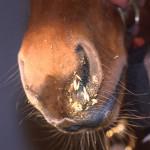As we all know, during these cold winter months, we can get breathless at the best of times and the common cold is rife so think of your horses being kept in the warm for long periods of time and it wonât surprise you that respiratory problems can happen.
Recurrent Airway Obstruction (RAO) can be caused by particles in the air, irritating the inside lining of the nasal passages and lungs. This is caused by tiny particles in the stable and bedding.
Symptoms can include the following:
Nasal discharge, cough, wheezing at exercise (leading to poor performance) and in severe cases, when the horse is at rest.
LOOK OUT FOR MUCUS AROUND THE STABLE OR JUST OUTSIDE WHEN CHECKING YOUR HORSE IN THE MORNING.
What can I do to solve this?
If your horse is sensitive, turning them out may be the best answer to this however, it is understandable that many owners do not have the facilities to do this due to restrictions on land that yards can impose and so you should take adequate measures to ensure the stable is as clean as possible.
Another thing to remember is ventilation. Now I know we like to keep our horses snug and warm and avoid draughts however, there must be air flow into the building to allow the removal of most of the dust and particles.
What about my horseâs bedding?
Try to keep the stable free from any cobwebs as these attract dust. Ensure that any banks used in the beds are clean and are regularly changed to help stop a build up of mould spores. Try to extract any dust from bedding. Paper or cardboard would be your best bet as these are the least likely to attract dust. If you can, AVOID straw and although shavings and woodchip are popular, they MUST be kept spotlessly clean.
Rubber matting is becoming more and more popular as a result of the fact that only a small amount of bedding is required however, it is very important that you take into account the drainage when fitting the rubber mats so that urine can drain away and not become trapped under the mats resulting in ammonia building up. Make sure that the mats are tightly fitted so no liquid can get trapped to avoid the mats moving around under your horses feet.
AVOID deep litter systems because of the harmful ammonia that builds up which is harsh on the nasal passages and lungs as well as it being TOXIC.
If your horse is in livery, be aware of what neighbouring horses have as their bedding as if your horseâs next door neighbour has straw, it can defeat the object of what you are trying to achieve.
When it comes to feeding, use haylage as a forage source or, soak any hay feed for 20-30 minutes before giving to your horse to bind the dust and spores to the stem so that they are swallowed rather than inhaled.
Another method that is sometimes used is steaming. You can use a large clean dustbin and tip a kettle of boiling water or, you can buy one of the new hay steaming devices that are becoming available on the market.
NEVERÂ feed any hay that smells âmustyâ or stable and has visible patches of mould.
If your horse is very sensitive, diets are available which can replace the hay which is fed soaked to abolish dust. Ensure to keep feed bowls and managers spotless as harmful mould spores can be present in leftover feed stuck to dirty bowls.
If you can, feed your horse from the floor to ensure that your horse is feeding as naturally as possible and allowing any mucus to drain from their nostrils.
What about exercise?
Turn your horse out AS MUCH AS POSSIBLE as the clean air will benefit more than most things as well as the moving around the field. Remember that horses are like us and exercise does them good! As does running around with their friends!
Lastly, remember that if your concerned and your horseâs symptoms are severe, contact your vet. They can prescribe tablets called bronchodilators which help keep airways open and clear.
REMEMBER, MOST IMPORTANTLY KEEP THE AIR YOUR HORSE BREATHES IN CLEAN.
Bear these tips in mind and your horse will have a happy, healthy horse.
The Stable Doctor
https://primestables.co.uk/news
Advice is given without legal responsibility
Researched: SPR Centre


